What Is Digital Ownership? NFTs Redefining Property
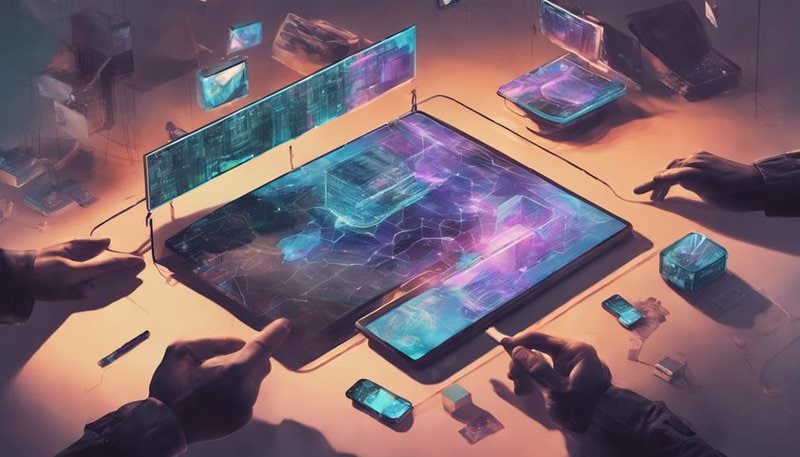
NFTs, or non-fungible tokens, have gained popularity in recent years as a way to represent ownership of unique digital items.
These tokens are built on blockchain technology, which ensures their authenticity and scarcity.
Each NFT contains metadata that describes the digital asset it represents, such as an image, video, or piece of music.
NFTs have opened up new opportunities for creators to monetize their work and for collectors to own digital items in a way that was not possible before.
The uniqueness and verifiability of NFTs make them valuable as collectibles, and their decentralized nature means that ownership is transparent and cannot be easily disputed.
Despite their potential, NFTs have also faced criticism for their environmental impact and the potential for fraud.
As the technology continues to evolve, it will be important for creators, collectors, and regulators to address these issues and ensure the responsible growth of the NFT market.
Key Takeaways
- NFTs redefine ownership by granting exclusive rights to digital assets.
- Legal frameworks around NFT ownership are evolving to address complexities.
- NFT adoption trends offer insights into digital ownership possibilities.
- NFTs challenge traditional property rights, reshaping concepts in the digital realm.
Understanding Digital Ownership
In the digital age, ownership has taken on a whole new dimension with the rise of NFTs, redefining how we perceive and interact with property. Understanding ownership rights in the realm of digital property is crucial as we navigate this evolving landscape. NFTs, or non-fungible tokens, provide a unique way to assert ownership over digital assets. They grant individuals exclusive rights to a digital piece, whether it be artwork, music, or even virtual real estate.
With traditional ownership, physical possession often signifies control. However, in the digital realm, ownership is more nuanced. NFTs operate on blockchain technology, creating a transparent and secure ledger of ownership. This innovation not only validates ownership rights but also ensures authenticity and provenance of digital property.
As you delve into the world of NFTs and digital ownership, consider the implications of owning intangible assets. The concept of ownership is expanding beyond tangible objects, challenging us to redefine our understanding of property rights in this digital age. Embrace this shift with curiosity and a willingness to explore the uncharted territories of digital ownership.
Evolution of NFTs
As you explore the evolution of NFTs, consider the trends shaping their adoption, the legal complexities they introduce, and the exciting future innovations they may hold.
Understanding how NFTs are being embraced by creators, collectors, and investors can provide valuable insights into the changing landscape of digital ownership.
Stay curious about the legal frameworks evolving around NFTs and the endless possibilities they bring to the world of property rights.
NFT Adoption Trends
Embracing the digital evolution, NFTs are altering the landscape of ownership in profound ways. As you delve into the world of NFT adoption trends, consider these insightful points:
- Diverse NFT Marketplaces: Explore the varied platforms offering unique digital assets, each with its own community and specialties.
- Investment Opportunities: Witness how NFTs are reshaping the investment landscape, providing new avenues for financial growth and creativity.
- Blockchain Technology: Discover the power of blockchain in ensuring transparent, secure, and decentralized ownership of NFTs.
- Growing Creativity: Experience the surge of artistic expression as creators and collectors leverage NFTs to redefine digital ownership and artistic value.
In this evolving landscape, NFT adoption trends offer you a glimpse into the exciting possibilities of digital ownership.
Legal Implications of NFTs
Navigating the ever-changing landscape of NFT adoption trends reveals a crucial element that demands attention: the legal implications of NFTs, particularly in their evolution. As NFT ownership expands, understanding the legal framework surrounding these digital assets is paramount.
Questions around ownership rights and intellectual property require careful consideration. The decentralized nature of blockchain technology adds complexity to issues like copyright, royalties, and fraud protection. Ensuring clarity in NFT transactions and contracts is essential to safeguarding both creators and buyers.
Legal disputes may arise from issues such as authenticity, resale rights, and licensing agreements. It's crucial to stay informed and seek legal advice to navigate the evolving landscape of NFT ownership and its legal implications effectively.
Future NFT Innovations
Embarking on the path of Future NFT Innovations reveals a realm where creativity and technology converge to redefine digital ownership. In this ever-evolving landscape, the future of NFTs holds exciting possibilities, shaping the way we interact with digital assets.
Here are four intriguing developments to look forward to:
- Gaming Innovations: NFTs are set to revolutionize the gaming industry, offering players true ownership of in-game assets and enabling unique gaming experiences.
- Virtual Fashion: The intersection of NFTs and virtual fashion opens doors to personalized digital wardrobes, where individuals can express themselves creatively in the virtual realm.
- Artistic Expression: NFTs will continue to empower artists, musicians, and creators to monetize their work directly, bypassing traditional intermediaries.
- Collectibles Expansion: NFTs will expand into new realms of collectibles, from digital stamps to virtual real estate, providing diverse investment opportunities.
Tokenizing Digital Assets
Tokenizing digital assets is a revolutionary process that's reshaping the concept of ownership in the digital realm. Through the token economy, digital collectibles are being transformed into unique tokens that represent ownership or proof of authenticity. This innovation allows individuals to truly own and trade digital assets in a secure and transparent manner.
The tokenization of digital assets brings a new level of trust and authenticity to the digital world. By converting digital collectibles into tokens, each item gains a distinct identity on the blockchain, ensuring its scarcity and uniqueness. This not only enhances the value of digital assets but also creates a more liquid market for trading these items.
In this era of rapid technological advancement, embracing the tokenization of digital assets opens up a world of possibilities for both creators and collectors. It provides a means to securely own, transfer, and monetize digital goods, paving the way for a future where digital ownership is as tangible and respected as physical ownership. Embrace this shift, for it's shaping the future landscape of digital ownership.
NFTs in the Art World
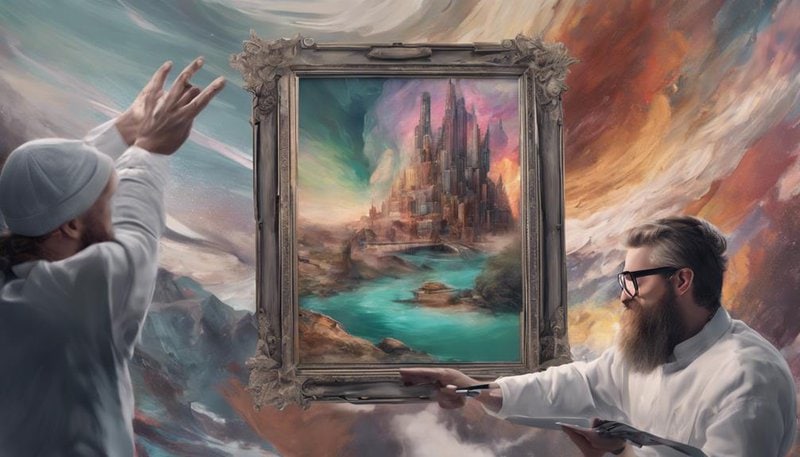
As the art world evolves, the integration of NFTs is revolutionizing how artists and collectors interact with digital assets. Embracing NFTs in the art world opens up new avenues for creative expression and ownership. Here are some key aspects to consider:
- Artistic Expression: NFTs enable artists to explore innovative ways of showcasing their work, breaking free from traditional constraints. Through NFTs, artists can experiment with unique digital formats, enhancing their creative reach.
- Market Trends: The art market is witnessing a shift towards digital ownership facilitated by NFTs. This trend is reshaping how art is valued, bought, and sold, creating opportunities for artists to engage with a global audience directly.
- Community Engagement: NFTs foster a sense of community among artists and collectors, connecting them through shared appreciation for digital art. This interconnectedness nurtures collaboration and support within the art world.
- Authenticity and Ownership: NFTs provide a secure platform for verifying the authenticity and ownership of digital artworks, ensuring transparency and trust in the art market.
Impact on Music Industry
The evolution of NFTs is profoundly impacting the music industry, reshaping how artists engage with their audience and monetize their creations. Through NFTs, musicians can directly connect with their fans, offering exclusive content or experiences in a way that fosters a deeper sense of community and support. This newfound closeness not only enhances the fan experience but also allows artists to gain more control over their work and revenue streams.
One significant way NFTs are influencing the music industry is by revolutionizing the distribution of streaming royalties. Artists can now tokenize their music, giving fans the opportunity to purchase songs or albums directly from the creators. This direct-to-consumer approach cuts out intermediaries, ensuring that artists receive a more significant portion of the revenue generated from their music.
Moreover, NFTs are promoting artist empowerment by providing them with a platform to showcase their work securely and transparently. This increased autonomy allows musicians to take charge of their careers, build stronger relationships with their supporters, and explore innovative ways to monetize their art beyond traditional means.
Collectibles and NFTs
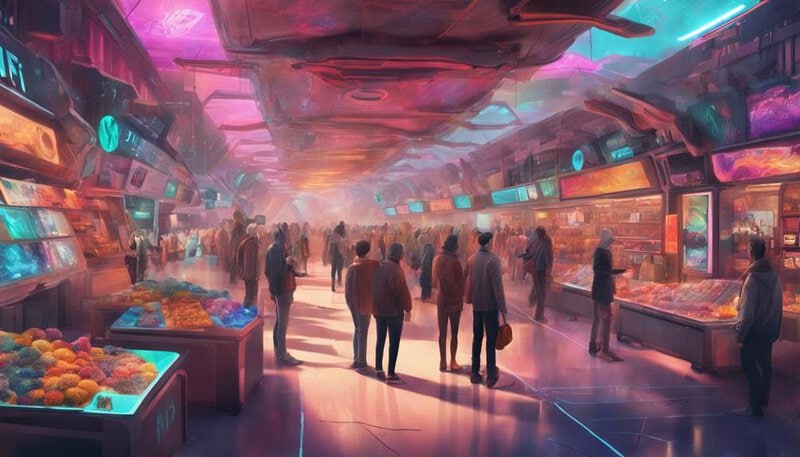
Embracing the realm of collectibles through NFTs opens up a new dimension of ownership and value in the digital landscape. When you delve into the world of blockchain collectibles and digital artistry, you're immersing yourself in a universe where uniqueness and authenticity reign supreme. Here are some insights to guide you through this exciting journey:
- Uniqueness Amplified: Each NFT represents a one-of-a-kind digital asset, making your collectible truly special and distinct from any other.
- Artistic Expression Unleashed: Through NFTs, artists can explore new frontiers of creativity, pushing boundaries and redefining what art means in the digital age.
- Ownership Reinvented: Owning an NFT means owning a piece of the digital world in a tangible way, empowering you to connect with the art and the artist on a deeper level.
- Community Connection: NFTs foster a sense of community among collectors, artists, and enthusiasts, creating a network of like-minded individuals passionate about digital ownership and creativity.
As you navigate the world of blockchain collectibles and digital artistry, remember that every NFT holds a story, a piece of history, and a touch of magic waiting to be discovered.
Virtual Real Estate Market
Exploring the vast landscape of the virtual real estate market reveals a realm where digital properties hold unprecedented value and potential for growth. In this dynamic virtual reality, blockchain technology plays a pivotal role in ensuring secure transactions and establishing ownership rights.
As you navigate this digital terrain, consider the parallels between traditional real estate and its virtual counterpart. Just as location is crucial in physical real estate, the desirability of virtual properties often hinges on factors like visibility, accessibility, and surrounding virtual amenities.
Investing in virtual real estate can offer diverse opportunities for creativity, business ventures, and community building. Whether you aspire to create a virtual storefront, establish a virtual art gallery, or simply own a piece of the metaverse, the virtual real estate market is ripe with possibilities waiting to be explored.
NFTs and Intellectual Property Rights
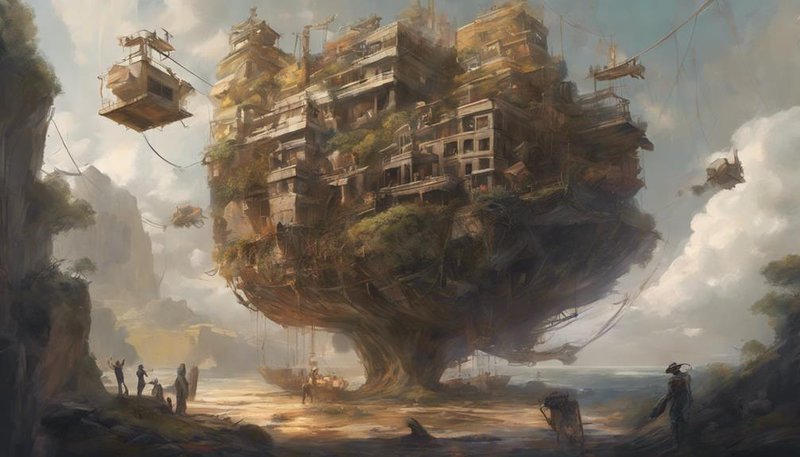
As you explore the realm of NFTs and Intellectual Property Rights, consider the intricate dance between NFTs and copyright laws. The rising importance of artist attribution within the NFT space is another crucial aspect to ponder. Additionally, the innovative concept of tokenizing creative works for ownership and authenticity plays a significant role in this domain.
These points underscore the transformative power NFTs hold in reshaping traditional notions of intellectual property and ownership, sparking thought-provoking discussions on the future of digital assets and creativity.
Embrace the evolving landscape of NFTs as they challenge established norms and pave the way for new possibilities in the realm of intellectual property rights.
NFTs and Copyright
Navigating the realm of NFTs involves understanding how these digital assets intersect with copyright and intellectual property rights. When it comes to NFTs and copyright, here are four key points to consider:
- NFTs and Licensing: NFTs provide a new way for creators to license their work, allowing for unique ownership and usage rights to be embedded directly into the digital asset.
- Digital Art Authentication: NFTs serve as a form of digital art authentication, offering a secure and transparent way to verify the authenticity and ownership of digital artworks.
- Respect Copyright Laws: Ensure that when buying or selling NFTs, you respect the original creator's copyright and intellectual property rights.
- Consult Legal Experts: If you're unsure about the copyright implications of NFTs, it's wise to seek guidance from legal professionals specializing in intellectual property.
Artist Attribution With NFTs
When it comes to NFTs and intellectual property rights, ensuring proper artist attribution through the use of blockchain technology is paramount in preserving the authenticity and recognition of creative works. Upholding artist rights and ownership rights is crucial in the digital landscape where artworks can be easily replicated and disseminated.
By utilizing NFTs, artists can embed their information directly into the token, guaranteeing that their creative endeavors are forever linked to them. This not only safeguards the integrity of the artwork but also provides a transparent and immutable record of ownership.
Embracing this technology not only empowers artists but also fosters a culture of respect for creators and their contributions, reinforcing the value of artistic expression in the digital age.
Tokenizing Creative Works
Tokenizing creative works through NFTs revolutionizes the landscape of intellectual property rights, offering artists a secure and innovative way to establish ownership and authenticity in the digital realm. Embracing this transformation empowers creators like yourself to navigate the complexities of the digital age with confidence and clarity. Consider these insights as you delve into the world of tokenized ownership:
- Empowerment: NFTs grant you full control over your creative output.
- Transparency: Blockchain technology ensures transparent ownership records.
- Global Reach: Reach a broader audience while safeguarding your intellectual property rights.
- Monetary Rewards: Benefit from direct sales and royalties through smart contracts.
May your creative journey be enriched by the boundless possibilities that tokenizing your work brings.
Challenges and Considerations
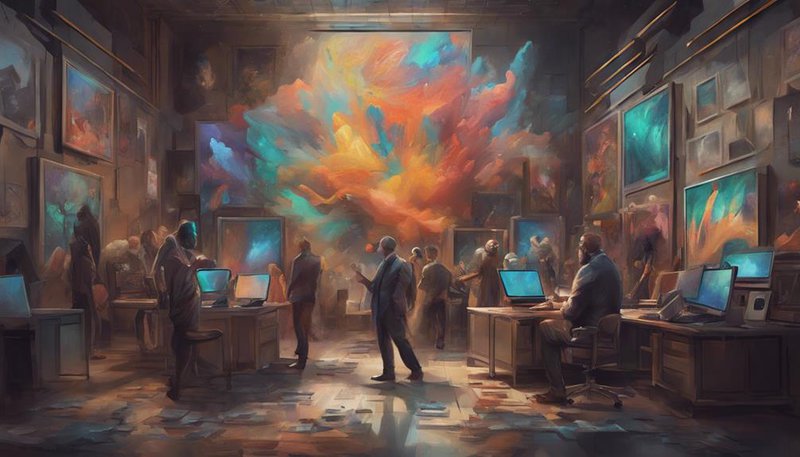
In the realm of digital ownership, embracing the challenges and considerations surrounding NFTs is essential for navigating the evolving landscape of property rights. Ownership challenges in the digital space often stem from the intangible nature of assets. With blockchain solutions, however, verifiable ownership can be established, offering a way to address these challenges. Decentralized control plays a vital role in ensuring the authenticity and uniqueness of digital assets, providing a level of security and transparency that traditional systems may lack.
When considering digital ownership, it's crucial to recognize the potential risks associated with NFTs, such as copyright infringement and counterfeiting. By staying informed and vigilant, you can protect your digital assets and rights effectively. Additionally, understanding the environmental impact of blockchain technology is key, as the energy consumption of NFT transactions has raised concerns.
Future of Digital Ownership
As the landscape of digital ownership continues to evolve, envisioning the future of NFTs and property rights holds the promise of reshaping the very essence of ownership in the digital realm. Here are some insights to guide your understanding of what lies ahead:
- Digital Scarcity: Embracing the concept of digital scarcity through NFTs will redefine how we perceive the value of virtual assets, fostering a deeper appreciation for uniqueness in the digital space.
- Blockchain Impact: The continued integration of blockchain technology won't only enhance the security and transparency of digital ownership but also revolutionize the way transactions are conducted, ensuring greater trust and efficiency.
- Democratization of Ownership: NFTs have the potential to democratize ownership by allowing individuals from diverse backgrounds to participate in the digital economy, creating new opportunities for creators and investors alike.
- Evolution of Property Rights: The evolution of property rights in the digital realm will require a reimagining of traditional legal frameworks to accommodate the complexities of NFT ownership, paving the way for innovative solutions and collaborative approaches.
Frequently Asked Questions
Can NFTs Be Used to Prove Ownership of Physical Assets as Well?
Yes, NFTs can serve as proof of ownership for physical assets. Through blockchain technology, they offer a unique and secure way to verify possession. Embrace this innovative approach to safeguard your tangible belongings with confidence.
How Do NFTs Impact the Gaming Industry?
In the virtual economy of gaming, NFTs revolutionize ownership of in-game assets. Your gaming experience becomes truly unique as you possess items with real value. Embrace this new era where digital ownership enhances your gameplay.
Are There Any Environmental Concerns Associated With the Creation and Trading of Nfts?
Consider the environmental impact of NFTs. Energy consumption in their creation and trading raises concerns. By being mindful of these factors, you can contribute to a more sustainable digital landscape. Make informed choices.
What Are Some Potential Risks of Investing in Nfts?
Investing in NFTs carries risks like market volatility and regulatory compliance uncertainties. Prioritize due diligence, diversification, and understanding the market before diving in. Stay informed and seek guidance to navigate potential pitfalls wisely.
How Do NFTs Affect the Concept of Copyright and Fair Use in the Digital Age?
Consider the impact of NFTs on copyright. They challenge traditional notions, raising questions about ownership and rights. Fair use must adapt to this new landscape to ensure creators and consumers are protected.








